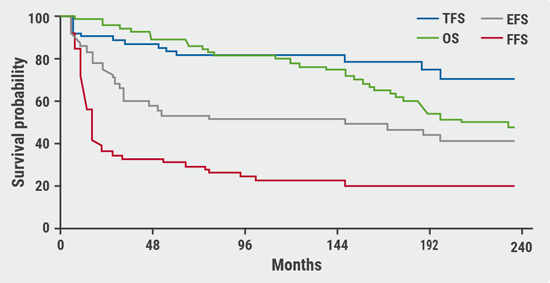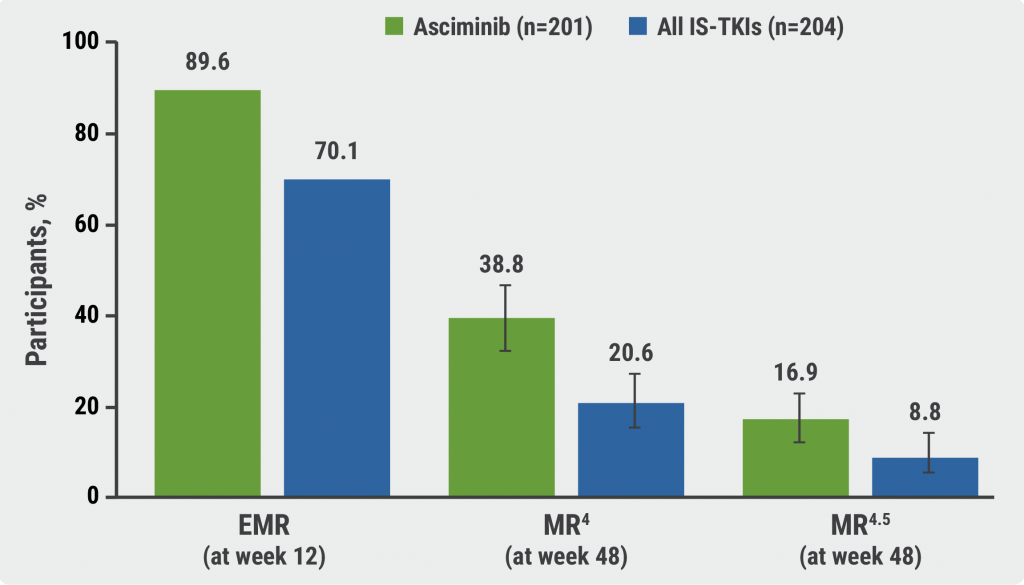
The study also found that a complete response to the treatment can further improve the survival rate. Compared with obinutuzumab plus chlorambucil, acalabrutinib-containing regimens were found to be more effective in improving the survival rate.
Medicom Medical Publishers interviewed lead investigator and presenter Prof. Jeff Sharman (Director of Research, Willamette Valley Cancer Institute, Oregon, and Medical Director, Hematology Research, The US Oncology Network, USA).
Can you summarise the key findings of the 6-year follow-up data from the ELEVATE-TN trial?
“The ELEVATE-TN trial has demonstrated that acalabrutinib, either as monotherapy or in combination with obinutuzumab, is a highly effective and well-tolerated treatment option for patients with chronic lymphocytic leukaemia (CLL), answered Prof. Sharman. “The 6-year follow-up data showed that both acalabrutinib-obinutuzumab and acalabrutinib monotherapy significantly improved progression-free survival (PFS) compared with obinutuzumab and chlorambucil. The addition of obinutuzumab to acalabrutinib further improved PFS and response rates.”
What are the implications of these findings for the treatment of CLL?
“The ELEVATE-TN trial results further solidify the position of acalabrutinib as a leading treatment option for patients with CLL. The study showed that acalabrutinib can provide durable benefits for patients, regardless of their genomic marker status. The long-term safety profile of acalabrutinib is also reassuring.”
What do you think are the most important takeaways for oncologists from this study?
“The ELEVATE-TN trial has provided valuable data that oncologists can use to make informed treatment decisions for patients with CLL. The study results show that acalabrutinib is a highly effective and well-tolerated treatment that can provide long-term benefits for patients. In addition to the key findings mentioned above, the ELEVATE-TN trial also demonstrated that acalabrutinib can provide significant benefits for patients with CLL, regardless of their age or performance status”, Prof. Sharman continued. “However, I would like to note that the trial allowed performance status 0-2, so we cannot necessarily generalise to all performance statuses. The study also showed that acalabrutinib is associated with a low incidence of adverse events, including cardiac-related adverse events.”
Prof. Sharman concluded: “Overall, the ELEVATE-TN trial results provide strong evidence that acalabrutinib is a highly effective and well-tolerated treatment option for patients with CLL. The study results also suggest that acalabrutinib can provide durable benefits for patients, regardless of their genomic marker status or other patient factors.”
Copyright ©2023 Medicom Medical Publishers
Posted on
Previous Article
« Talking Medicine in 2024 Next Article
First-line and second-line benefit of amivantamab in advanced, EGFR-mutated NSCLC »
« Talking Medicine in 2024 Next Article
First-line and second-line benefit of amivantamab in advanced, EGFR-mutated NSCLC »
Table of Contents: ASH 2023
Featured articles
Meet the Trialist: Prof. Jeff Sharman on ELEVATE-TN
Leukaemia
FLT3-ITD-specific MRD assessment useful for clinical management of AML
MRD status rather than FLT3-ITD co-mutation is linked to the benefit of CR1-allo in NPM1-mutated AML
Promising results for quizartinib, venetoclax, and decitabine in FLT3-ITD mutated AML
AUGMENT-101: Excellent results for revumenib in R/R KMT2Ar leukaemia
Blinatumomab reduces toxicity in the consolidation phase in paediatric high-risk B-cell ALL
Promising results for olverembatinib in combination with venetoclax for Ph+ ALL
Undetectable MRD on maintenance venetoclax, acalabrutinib, and obinutuzumab in the majority of R/R CLL participants
Lymphoma
Is allogeneic stem cell transplantation a solid option in R/R LBCL or R/R T-cell lymphoma?
Encouraging results for the addition of acalabrutinib to lenalidomide and rituximab in follicular lymphoma
Can ibrutinib ameliorate outcomes in R/R ABC-DLBCL undergoing autoSCT?
Primary phase 2 efficacy and safety results of M-Pola in relapsed/refractory LBCL
SYMPATICO: Ibrutinib plus venetoclax boosts PFS in R/R mantle cell lymphoma
Multiple Myeloma
KdD outperforms Kd in R/R MM also in participants with poor renal function
IsKia: Novel treatment regimen for MM delivers high MRD-negativity rates
Novel standard-of-care in newly diagnosed MM
Myeloproliferative Neoplasms
TRANSFORM-1: High spleen volume reduction rates for navitoclax plus ruxolitinib in myelofibrosis
Momelotinib beats controls regarding transfusion outcomes in myelofibrosis
DALIAH: Peginterferon-α head-to-head against hydroxyurea in MPN
Non-Malignant Haematology
Long-term efficacy and safety of iptacopan in PNH with anaemia
ADVANCE IV: Swift responses on efgartigimod in ITP
Favourable QoL and bleeding outcomes for rilzabrutinib in ITP
Novel risk assessment model acts on increasing hospital-acquired venous thromboembolism rates among children
Miscellaneous Topics
Axatilimab may present a new therapeutic strategy in chronic GvHD
Pomalidomide may become the first approved therapy for hereditary haemorrhagic telangiectasia
Ancestry-specific study into CH delivers new leads
Featured Interviews
Interview: Sandwich treatment model shows promise for mantle cell lymphoma
Meet the Trialist: Prof. Jeff Sharman on ELEVATE-TN
Related Articles

February 18, 2021
PFS and ORR benefits of first-line ibrutinib-based treatment in CLL

© 2024 Medicom Medical Publishers. All rights reserved. Terms and Conditions | Privacy Policy
HEAD OFFICE
Laarderhoogtweg 25
1101 EB Amsterdam
The Netherlands
T: +31 85 4012 560
E: publishers@medicom-publishers.com

